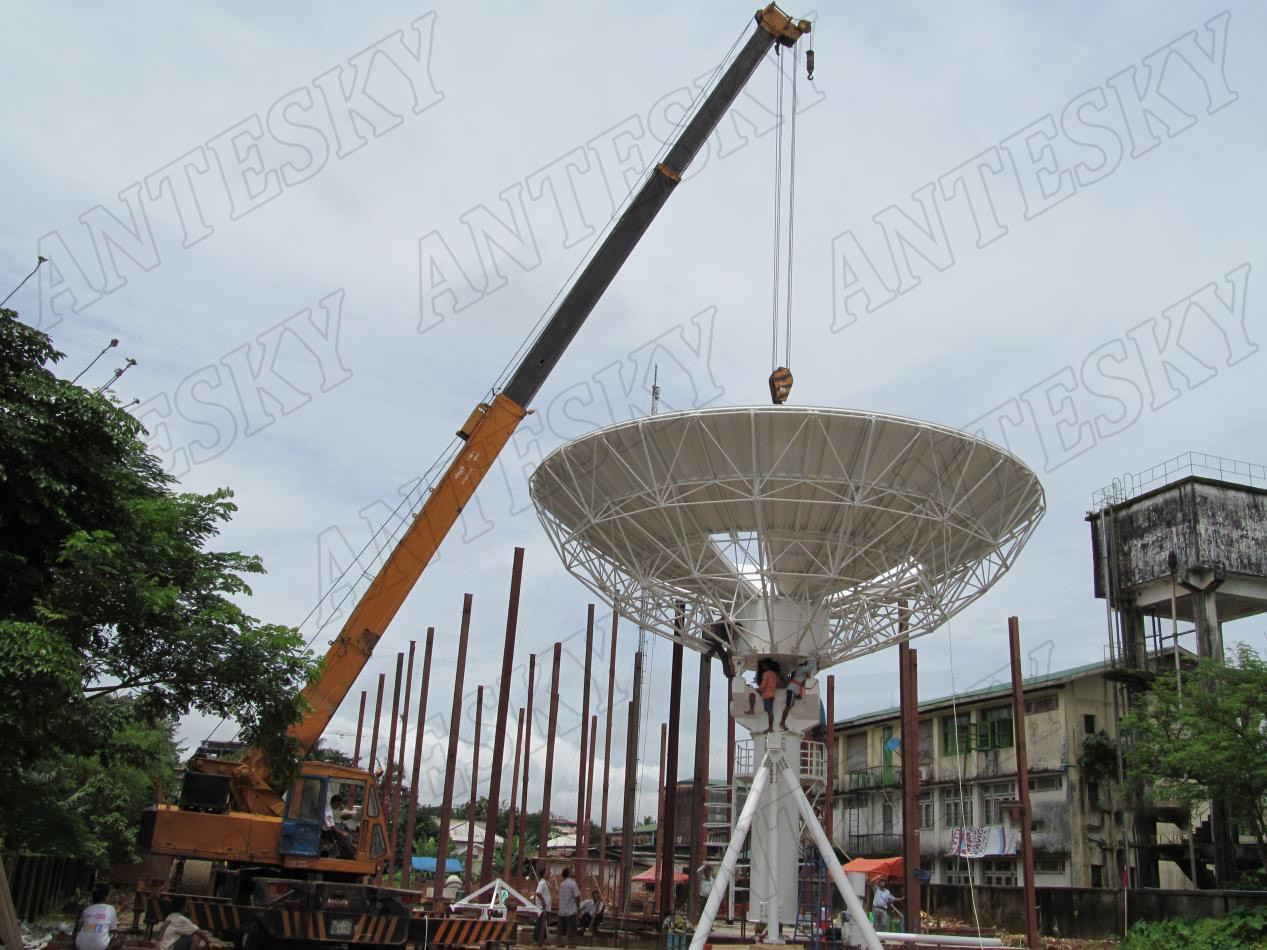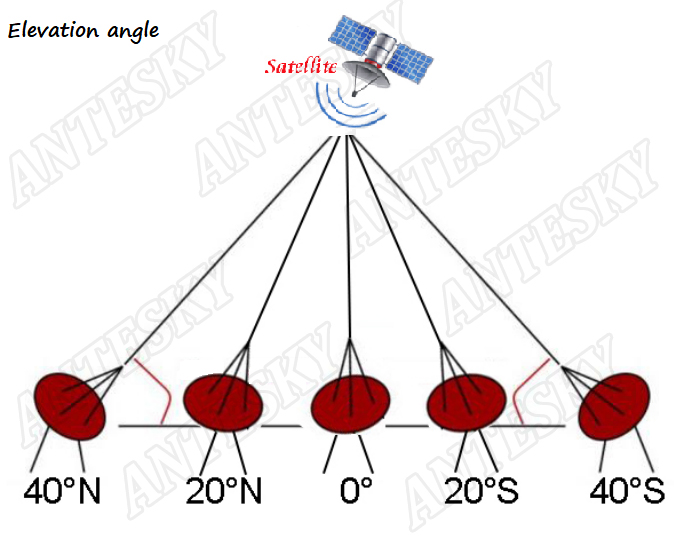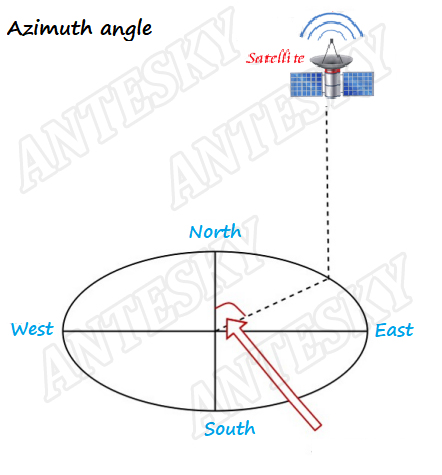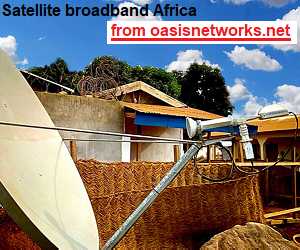 Copyright © www.antesky.com
Copyright © www.antesky.comThe satellite antenna is one of the main equipment of the earth communication station, and the quality of the signal determines the performance of the satellite receiving system, so satellite antenna adjustment and aligning is important. To achieve the optimal performance of the antenna, that is, to receive the highest quality signal, the following points need to be noted.
First, choose a suitable site;
Secondly, install it efficiently and accurately;
Thirdly, after the installation is completed, the antenna should be adjusted to the satellite until the best signal is found;
Finally, after the equipment is operating normally, pay attention to the daily maintenance of the antenna to extend the service life of the antenna.
1.Site selection of Satellite Antenna station
The installation of satellite antennas must take full account of the local natural environment and electromagnetic environment, the choice of the site is particularly important. Satellite ground receiving stations must be built in the area covered by synchronous satellites to avoid interference factors such as high-voltage power lines, aircraft channels, etc. Try to avoid radar stations and other broadcasting, communication system interference, to prevent industrial and other ground interference, satellite dishes are generally installed on the ground, can not be too far away from the chassis room. We have provided a detailed description of how to select a suitable antenna site in a previous article, please refer to this link.
2. Satellite Antenna installation
The installation process of the satellite antenna must strictly follow the installation manual provided by the manufacturer. Before installation, understand the weather forecast of the day to avoid personal injury caused by weather disasters during the installation process. Check all installation parts before installation, and start installation after ensuring that the parts are not missing or damaged. At the same time, prepare the installation equipment to ensure the installation progress and do cleaning work after completing installation. At the same time, we also have a blog that guides you to efficiently install the antenna for your reference. We have profound experience especially for antenna installation. Please check below photo that we were almost finished installation for 11.3m antenna and labors were hoisting the rest of panels.
 Copyright © www.antesky.com
Copyright © www.antesky.com3. Satellite Antenna adjustment and aligning
When the antenna is installed, the first thing is antenna aligning satellite to accurately and effectively receive the satellite signal.
Whether using C-band or Ku-band, the main form of satellite antenna is a parabolic antenna. For satellite antenna debugging, it refers to adjusting the azimuth, elevation and polarization angle of the antenna so that the center of the antenna beam is aligned with the target satellite. Only when the antenna is accurately aligned with the target satellite can the earth station work stably and reliably.
3.1 Elevation angle
Elevation refers to the angle between the dish pointing direction, directly towards the satellite, and the local horizontal plane. It is the up-down angle.
 Copyright © www.antesky.com
Copyright © www.antesky.comFor the elevation angle, if the satellite close to the south direction is viewed at the same position, the elevation angle is the largest, which is a relative reference point during debugging. When watching different satellites at the same location, the elevation angle changes with the longitude of the satellite. When looking at the same satellite across the country, the elevation angle is inversely proportional to the latitude of the receiving place, the elevation angle decreases as the latitude increases, and vice versa, the elevation angle increases as the latitude decreases.
3.2 Azimuth angle
Azimuth refers to the rotation of the whole antenna around a vertical axis. It is the side to side angle. Typically you loosen the main mount bracket and swing the whole dish all the way around in a 360 deg circle. After the elevation angle is determined, you can use a compass to determine true south, and then move the satellite antenna gently according to the principle that in the northern hemisphere, the satellite’s longitude is less than the local longitude, and the direction is west by south, and greater than the local longitude, and then east by south. And by observing the signal quality and strength on the monitor, you can quickly find the correct satellite antenna viewing position and fix it.
 Copyright © www.antesky.com
Copyright © www.antesky.com3.3. How to align satellite
1) Calculate the polarization angle, elevation angle, and azimuth angle according to the latitude and longitude of the antenna location and the satellite longitude (or obtained by looking up the table, this calculator maybe helpful for you by entering longitude and latitude and then result turns out automatically.)
2) Calculate the theoretical values of the azimuth angle AZ, the elevation angle EL and the polarization angle POL when the local antenna is aimed at the target satellite;
3) Adjust the antenna elevation angle to the theoretical value by using a geological compass or inclinometer. when adjusting the elevation angle, find a plane on the antenna parallel to the antenna mouth surface, use the protractor to determine the actual elevation angle of the antenna, and slowly adjust the antenna elevation screw. Let the elevation angle of the antenna be the calculated local elevation angle parameter.
When testing the antenna elevation angle, the side with the reflector must face up, and the side with the scale must point to the ground. At this time, the fingers of the hand holding the compass slowly flick the iron plate behind the compass to adjust the level. Pay attention to the level inside the compass. At this time, try to place the bubble of the level at the center line, and read the scale pointed by the level is the antenna The pitch angle. (Note: When testing the pitch angle, the verticality of the pole must be tested first to ensure the accuracy of the test. The side with the scale must point to the ground, otherwise the pitch angle error is 2 to 3 degrees.)
When testing the azimuth angle, the compass should be kept level to avoid getting too close to the antenna or too close to the mobile phone. The magnetic field of the mobile phone will act like a magnet, causing the pointer to fail.
4) Connect LNB and receiver or receiving card, adjust to the required polarization direction. This step is for coarse adjustment;
5) Select a known TV program or data broadcast signal on the target satellite, and the user sets the parameters of the known signal;
6) When adjusting the azimuth angle of the antenna, the local true south direction should be clarified. Using the true south direction as the reference, slowly adjust the azimuth screw of the antenna so that the azimuth angle of the antenna is the calculated local azimuth parameter. Adjust the antenna direction and lock the received signal so that the received signal strength displayed by the receiver or receiving card is the strongest and the signal quality is the best;
7) Fix the azimuth, elevation and polarization angle of the antenna, and the alignment is completed.
Welcome to talk further with us if you have other suggestion via sales@antesky.com. Thanks.






